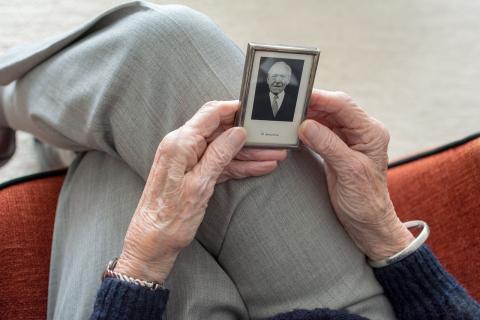EMA recommends not approving donanemab for Alzheimer's
EMA’s human medicines committee has recommended not authorising the marketing of Kisunla (donanemab), a drug intended for the treatment of early-stage Alzheimer's disease. The committee considered that the benefits of this drug were not great enough to outweigh the risk of potentially fatal events. In recent years, several patients have died due to microbleeds in the brain.

Jordi Pérez Tur - donanemab EN
Jordi Pérez-Tur
Research scientist at the Public Research Organisation (PRO) at the Institute of Biomedicine of Valencia of the Spanish National Research Council (CSIC)
In 1999, Schenk and colleagues published an encouraging paper in Nature reporting that immunisation with beta-amyloid in genetically modified mice that developed deficits similar to those caused by Alzheimer's disease in humans reduced the impact of the disease in the animals, even improving certain cognitive abilities in the treated animals. This methodology was tested in humans and, while certain results were encouraging, there were also a number of cases where immunisation resulted in serious cerebrovascular problems. In other words, while it may have worked, the therapy could cause more damage than it was intended to repair.
Since then, work has been ongoing on various alternatives and modifications of such therapies to maintain, or enhance, the beneficial effects of this immunisation while trying to avoid the more severe side effects. In recent months, similar products have been deauthorised and then authorised for use, the most prominent being lecanemab, which was not authorised initially but was later found to be somewhat effective in a particular group of patients.
In this case, as with lecanemab, the European agency, which carries out an independent analysis of the results of clinical trials, does not agree with the conclusions of its US counterpart, the FDA, and considers that the use of donanemab poses a high risk of cerebrovascular problems with a very slight improvement in the symptomatology of Alzheimer's disease. On the previous occasion, the EMA did follow the FDA's lead and authorised the use of lecanemab in patients for whom it was not contraindicated. It remains to be seen whether Eli Lilly has data that could lead to a similar change in the near future, although it would be surprising if they had not already presented it.
Robert Howard - donanemab EN
Robert Howard
Professor of Old Age Psychiatry, UCL Division of Psychiatry, UCL
The EMA decision is unsurprising as the benefits of treatment are extremely small and would be impossible to detect in a single patient. The risks of treatment are significant. However, it is worth bearing in mind that EMA made a similar initial decision about lecanemab last year but reversed this for a group of people with Alzheimer’s disease after the manufacturer appealed.
Tara Spires-Jones donanemab EMA EN
Tara Spires-Jones
Director of the Centre for Discovery Brain Sciences at the University of Edinburgh, Group Leader in the UK Dementia Research Institute, and Past President of the British Neuroscience Association
People living with Alzheimer’s disease in Europe will no doubt be disappointed by the decision from the European Medicines Agency not to approve donanemab, a new treatment for early Alzheimer’s disease. This medicine has been shown in clinical trials to moderately slow progression of Alzheimer’s symptoms, but it does come with risk of brain swelling and bleeding. There is hope from ongoing scientific research that safer, more effective medicines will be developed in the future.
Conflict of interest: "I have no conflicts with this drug but have received payments for consulting, scientific talks, or collaborative research over the past 10 years from AbbVie, Sanofi, Merck, Scottish Brain Sciences, Jay Therapeutics, Cognition Therapeutics, Ono, and Eisai. I am also Charity trustee for the British Neuroscience Association and the Guarantors of Brain and serve as scientific advisor to several charities and non-profit institutions".
Marc Suárez Calvet - donanemab EMA EN
Marc Suárez-Calvet
Researcher at the Barcelonabeta Brain Research Center and the Neurology Service of the Hospital del Mar (Barcelona)
The European Medicines Agency CHMP's negative opinion on donanemab is based on the assessment that its benefits do not outweigh the risks, in particular due to one of the associated adverse effects, ARIA [amyloid-related imaging abnormalities]. Specifically, ARIA occurred in 36.8% of patients treated with donanemab, compared to 14.9% of those receiving placebo. Although most cases were asymptomatic, 1.6% of treated patients experienced severe ARIA events, with fatal outcomes in three cases. In addition, the CHMP has not accepted the proposal to restrict use of the drug to patients who do not carry the APOE ε4 allele, who have a lower risk of ARIA.
This decision contrasts with the previous approval of the drug in the US, UK, China and Japan, where the same clinical data were considered, as well as with the previous positive CHMP opinion on lecanemab, another anti-amyloid treatment. Given the precedent of lecanemab, which initially received a negative opinion but was later approved, it is possible that the decision on donanemab will be re-evaluated. The company's request for review opens the door to future discussions on the availability of this therapy in Europe.
Conflicts of interest: Marc Suárez-Calvet has participated in conferences and advisory committees organised by Eli Lilly, and the corresponding fees were paid directly to his institution. Marc Suárez-Calvet has not received any personal compensation from Eli Lilly or any other for-profit entity.
Juan Fortea - donanemab EMA EN
Juan Fortea
Director of the Memory Unit of the Neurology Service of the Hospital de la Santa Creu i Sant Pau and director of the Alzheimer's Unit at the Fundació Catalana Sindrome de Down
This is very disappointing news. The EMA's decision again departs from that taken by other regulatory agencies such as the FDA in the US, as well as in Japan and China, which have authorised the treatment. Personally, I do not agree with the EMA's assessment of the risk-benefit ratio of donanemab. It seems to me to underestimate the clinically significant benefits demonstrated in trials and to overestimate the risks, which are well characterised and can be adequately managed in a controlled clinical setting.
More generally, I believe that this decision reflects a worrying situation in Europe, as recently described by Mario Draghi in his report on the challenges facing the continent. In the biomedical field, we continue to lose competitiveness and responsiveness vis-à-vis other regions of the world, with direct consequences for patients and innovation.
Conflicts of interest: ‘I have participated in advisory boards of companies that support the development of these drugs’.



